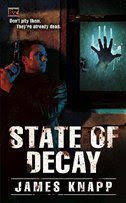
Novel:
STATE OF DECAY
website:
www.james-knapp.com/
1. Pitch your novel.
STATE OF DECAY is what I would call a science fiction thriller with a dash of zombie thrown in. It takes place in a future where biotechnology allows for the reanimation of dead bodies into organic machines called 'revivors'. Revivors are primarily used for military purposes, making full body donation an alternative to actually serving, but what exactly a revivor is and how much of the original donor survives the transition is something which is largely kept quiet. Since their inception they've begun to move into the labor and sex trade, becoming more pervasive in civilian life. It's while breaking up one of these rings that it's discovered there may be more to revivors than anyone knew, and the secrets they hold will bring a dark conspiracy to light.
2. What are your favourite three books?
- HELLSTROM'S HIVE by Frank Herbert
- MIND OF MY MIND by Octavia Butler
- GATEWAY by Frederik Pohl
3. What made you want to be a writer?
It may sound cliché but I've just always loved to write. When I was a small boy our class used to write stories and our teacher had us bind them in cardboard covered with wallpaper; it was my favorite part of school hands down. It was all I wanted to do.
4. Who is you favourite character and why?
I have a weakness for the character Calliope Flax in STATE OF DECAY. I like the rawness of her, and I like how she grows throughout the series. She is also fun to write.

5. If you could, would you change places with any of your characters?
Given the trials they face I'm not so sure I would want to change places with any of them but I wouldn't mind knowing some of them.
6. When and where do you write?
I write at home on a laptop, and I always write my first draft in notepad (not sure why, just do). I tend to write late at night, and early in the morning...between say 11pm and 3am. I have a full time job, though, so that is partly out of necessity…even if I didn't though I'd still keep late hours. If I had my way, I'd keep a mostly nocturnal schedule.
7. What’s the best/worst thing about writing?
The best thing for me, hands down, is when a reader really gets me. I write knowing that not everything I flavor the story with is going to find its mark, and some might not even get noticed, but when all those little details really resonate with a reader, to me that's the best thing.
The worst thing for me is rereading that first draft. It's just painful.
8. What is something you didn’t know about the publishing industry before you had your first book published?
How slowly it moves. The time between my agent selling my first novel, to that novel actually seeing print was a little over a year. There are many rounds of editing to do, cover art to consider, etc. Everything about writing and publishing takes a lot of time. I don't think you could survive in this business without patience.
9. Do you have any advice for hopeful authors?
Three things:
- Be patient: Everything about writing takes patience. You will write many drafts, you will get a lot of rejection, and even once you get published you will still have a lot of work ahead of you. Develop a ‘long haul’ attitude.
- Make peace with your ego: If you're doing it right, people will criticize you. Sometimes they’re just being snarky but sometimes those people are right. When people cut apart something so close to you it stings, but learn to see your faults as a writer and adjust. Try and find a brutally honest source you trust, and listen to what they tell you even if it’s hard to hear.
- Do it for the love: If you don't love it, and I mean really love it, then you may as well save yourself the pain and do something you *do* love. Writing is a lot of work, it takes a lot of time, and there's no promise of fame, riches, or even recognition at the other end. I can't imagine spending this amount of time (well, voluntarily) doing something I didn't love.
10. How do you discipline yourself to write?
When I'm writing a first draft I set a word count to hit, usually around 2,000 words. When I'm editing I set a page count, usually twenty to forty pages, depending on the draft. I think play is good for the soul and everyone should work in a little every day if they can, but I try not to start until my writing is done.
 By John Wyndham
By John Wyndham






























